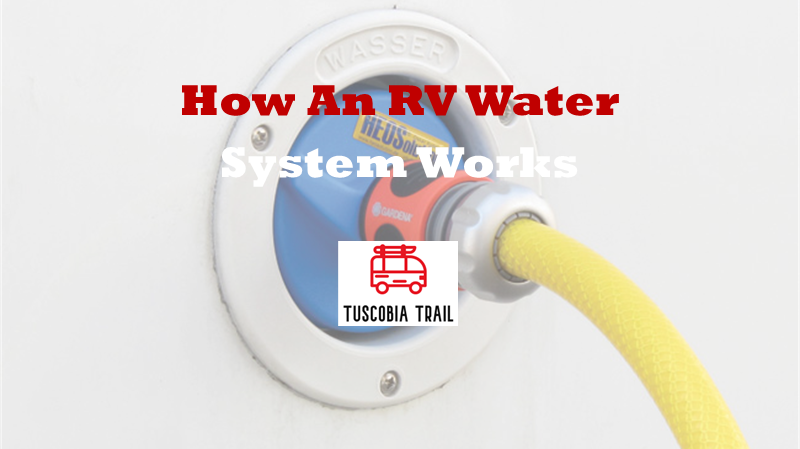Understanding and maintaining the water system in your RV is crucial. That starts with learning how an RV water system works in the first place!
A comfortable and hygienic camping experience is what you want, whether enjoying a weekend away of living full-time in your RV.
There are many parts to your water system that you will need to understand to get the most out of it. And to ensure you are drinking or using fresh water.
Having built our own campers, we’ve learned hands on about the intricacies of RV plumbing and how to keep your water clean and safe. From mistakes to discoveries, we can share our handy tips with others like you.
Understanding How Your RV Water System Works
Broken down simply, an RV’s water system consists of three main components:
- Fresh Water Tank: Stores clean water for drinking, cooking, and bathing.
- Gray Water Tank: Collects used water from sinks and showers.
- Black Water Tank: Holds sewage from the toilet.
These tanks work together to provide a self-contained water system and van lifers and RVers to enjoy modern conveniences even in remote locations.
Maintaining Your RV Water System & Pump
Regular maintenance is crucial for the longevity and efficiency of your RV’s water system and water pump. Here are some key maintenance tasks that we regularly schedule:
- Sanitize the fresh water tank regularly
- Flush and clean gray and black water tanks
- Inspect and maintain the water heater
- Use water filters and softeners for better water quality
- Regularly check for leaks and address them promptly
- Check on the water pump
Your RV’s water pump is essential for maintaining a reliable water supply during your travels and is the most crucial thing to check.
If your water pump is over ten years old, it may be nearing the end of its lifespan. Older pumps are more prone to failure and may require replacement even if they appear to be functioning.
Consistently low water pressure can also indicate that the pump is struggling to function properly. If you notice a significant drop in pressure while using faucets or showers, it may be time for a new pump.
If the pump is running but no water is coming out of the faucets, this usually signifies a complete failure of the pump. In such cases, replacement is necessary.
Visible leaks around the pump or its connections can indicate wear and tear. If repairs do not resolve the issue, a replacement may be required.
If you experience blown fuses or intermittent power issues with the pump, this could signal deeper electrical problems that might not be worth repairing, especially if they lead to pump failure.
Sanitizing Your RV’s Fresh Water Tank
Sanitizing your fresh water tank is a crucial maintenance task. Here’s a step-by-step guide:
- Turn off the water heater and water pump.
- Drain the fresh water tank completely.
- Calculate the amount of bleach needed (1/4 cup per 16 gallons of tank capacity).
- Dilute the bleach in water and add it to the fresh water tank.
- Fill the tank with fresh water and run it through all faucets.
- Let the solution sit for 4-12 hours
- Drain and rinse the system until no bleach smell remains
FAQs
How often should I sanitize my RV’s fresh water tank?
For part-time RVers, sanitize after long periods of inactivity and after winter storage. Full-timers should sanitize 1-2 times per year.
Can I drink water from my RV’s fresh water tank?
Yes, if properly maintained and sanitized. However, many RVers prefer to use bottled water for drinking and cooking.
How do I maintain my RV’s water heater?
Regularly drain and flush the water heater, inspect heating elements for corrosion, and replace the anode rod when necessary.
What’s the difference between gray and black water tanks?
Gray water tanks collect used water from sinks and showers, while black water tanks hold sewage from the toilet.
Do I need to clean my gray and black water tanks?
Yes, but less frequently than the fresh water tank. Empty the tanks, then clean with an all-purpose cleaner and rinse thoroughly.
How long do RV water pumps typically last?
Most RV water pumps last between 5 to 10 years, depending on usage and maintenance. Regular maintenance includes checking for leaks, ensuring proper electrical connections, and cleaning filters to prevent clogs.
What should I do if my water pump fails while on the road?
If your water pump fails during travel, you can use bottled water for immediate needs until you can replace or repair the pump.
Is it easy to replace an RV water pump myself?
Yes, replacing an RV water pump can be a straightforward DIY task if you have basic tools and follow manufacturer instructions carefully.
